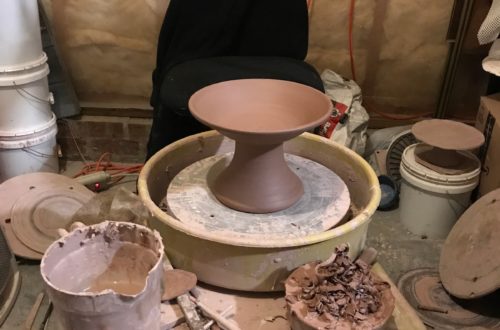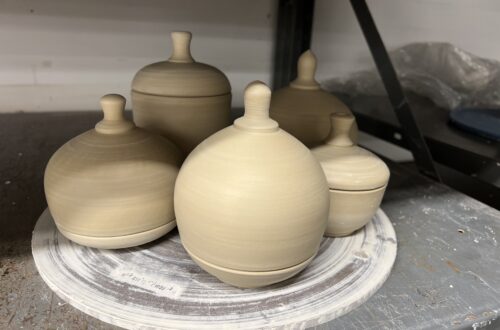Growing for Good: Native Plant Gardening
Whether we grew up in farming households, helped in the suburban yard, or lived in a concrete jungle, many of us started gardening as adults with a simple approach. We grabbed a few landscape plants from a big box store. Later, we found ourselves immersed in native plant sales at our local arboretum or botanical garden. Our mindset shifted from merely sprucing up the yard to designing a space that maximizes support of local biodiversity and habitat. We shifted in preference from turf grass to sedges and from tea roses to rose mallow.

While I grew up in a rural area, it was not until doing stream survey work as an undergrad that I was introduced to the concept of native plants and their importance to riparian areas and ecological restoration. As I learned more, I found that hikes in the woods became so much richer as I was able to observe and recognize different plant species. My concept of beauty has changed. I’ve always loved wild spaces, but now I see the functions of these spaces and appreciate that nature, while seeming chaotic, is quite organized and efficient.
Over the past 20 years, my appreciation of the work many people are doing to educate the public about native and invasive species has grown. Knowledge enhances our appreciation of nature. It changes our relationship to it. Hopefully, this compels us to participate as careful stewards of the land in our purview. I have decided to start a running list of the native plants in my yard so that others on a similar trajectory can pop over here and see what I’ve tried. I may eventually add pictures and commentary.
My current plantings are not strictly native species, so this list does not include everything in our one-third acre. As I fill in gaps and replace old plants, I’m choosing local or regional natives apart from fruits and vegetables for our family consumption. I’m doing this not out of elitism but out of serious concern over the die-off of insects and birds, knowing that one yard isn’t much, but it is a link in the patchwork of scarce resources.
As I am not a botanist, if you see something that does not belong on the list, please let me know!
Native Plant Catalog
| Scientific name | Common name | Image Link |
| Achillea millefolium | Common Yarrow | Yarrow, Achillea millefolium |
| Acorus calamus | Sweetflag | Sweetflag, Acorus calamus |
| Aesculus pavia | Red buckeye | Red buckeye, Aesculus pavia |
| Adiantum pedatum | Maidenhair fern | Maidenhair fern, Adiantum pedatum |
| Asarum virginicum | Heart-leaf ginger | Heart-leaf ginger, Asarum virginicum |
| Asclepias syriaca | Common Milkweed | Native Plant – Common Milkweed, Asclepias syriacam |
| Asclepias tuberosa | Butterfly weed | Butterfly weed, Asclepias tuberosa |
| Asimina triloba | American papaw | Pawpaw, Asimina triloba |
| Astilbe x arendsii ‘Fanal’ | Fanal Astilbe | Fanal Astilbe, Astilbe x arendsii ‘Fanal’ |
| Bignonia capreolata | Crossvine | Crossvine, Bignonia capreolata |
| Calycanthus floridus | Carolina allspice | Carolina allspice, Calycanthus floridus |
| Callicarpa americana | American beautyberry | American beautyberry, Callicarpa americana |
| Carex cherokenensis | Cherokee Carex | Cherokee Carex, Carex cherokenensis |
| Carex grayi | Gray’s sedge | Gray’s sedge, Carex grayi |
| Cephalanthus occidentalis | Buttonbush | |
| Cercis canadensis | Eastern redbud | Eastern redbud, Cercis canadensis |
| Chamaecrista nictitans | Sensitive partridge pea | Sensitive partridge pea, Chamaecrista nictitans |
| Chasmanthium latifolium | River Oats | River Oats, Chasmanthium latifolium |
| Chelone lyonii | Hot lips’ Turtlehead | Hot lips’ Turtlehead, Chelone lyonii |
| Chionanthus virginicus | White fringetree | White fringetree, Chionanthus virginicus |
| Clethra alnifolia | Coastal pepperbush | Coastal pepperbush, Clethra alnifolia |
| Cornus florida | Flowering dogwood | |
| Corylus americana | American Hazelnut | American hazelnut, Corylus americana |
| Dicentra exima | Bleeding heart | Bleeding heart, Dicentra exima |
| Echinacea purpurea | Purple Coneflower | Purple Coneflower, Echinacea purpurea |
| Echinodorus bracteatus ‘Lantau Lady’ | Amazon Sword | Amazon Sword, Echinodorus bracteatus ‘Lantau Lady’ |
| Elodea canadensis | Waterweed | Waterweed, Elodea canadensis |
| Erigeron ‘azurfee’ | Azure fairy | |
| Eryngium yuccifolium | Rattlesnake Master | Rattlesnake master, Eryngium yuccifolium |
| Eupatorium perfoliatum | American Boneset | |
| Eutrochium fistulosum | Joe pye weed | Joe pye weed, Eutrochium fistulosum |
| Equisetum arvense | Horsetail | Horsetail, Equisetum arvense |
| Fothergilla gardenii | Dwarf Fothergilla | Dwarf fothergilla, Fothergilla gardenii |
| Gelsemium sempervirens | Carolina jessamine | |
| Hamamelis virginiana | Witch hazel | |
| Hibiscus coccineus | Scarlet Rosemallow | Scarlet Rosemallow, Hibiscus coccineus |
| Hypericum densiflorum | Bushy St. John’s wort | |
| Ilex decidua | Possumhaw | Possumhaw, Ilex decidua |
| Ilex opaca | American holly | American holly, Ilex opaca |
| Ilex verticillata | Winterberry | Winterberry, Ilex verticillata |
| Itea virginica | Virginia Sweetspire | Virginia Sweetspire, Itea virginica |
| Juniperus virginiana | Eastern red cedar | |
| Kosteletzkya pentacarpos | Marsh mallow | Marsh mallow, Kosteletzkya pentacarpos |
| Lindera benzoin | Spicebush | Spicebush, Lindera benzoin |
| Lobelia cardinalis | Cardinal flower | Cardinal flower, Lobelia cardinalis |
| Lonicera sempervirens | Trumpet honeysuckle | Trumpet honeysuckle, Lonicera sempervirens |
| Magnolia grandiflora | Southern Magnolia | Southern Magnolia, Magnolia grandiflora |
| Monarda didyma | Bee Balm | |
| Nelumbo lutea | American lotus | American lotus. Nelumbo lutea |
| Onoclea sensibilis | Sensitive fern | |
| Oxydendrum arboreum | Sourwood | Sourwood, Oxydendrum arboreum |
| Peltandra virginica | Arrow arum | Arrow arum, Peltandra virginica |
| Polygonatum biflorum | Smooth solomon’s seal | |
| Polygonatum biflorum ‘Variegatum’ | Variegated Solomon’s Seal | Variegated Solomon’s seal, Polygonatum biflorum ‘Variegatum’ |
| Pontederia cordata | Pickerel weed | Pickerel weed, Pontederia cordata |
| Prunus angustifolia | Chickasaw plum | Chickasaw plum, Prunus angustifolia |
| Prunus serotina | Black cherry | Black cherry, Prunus serotina |
| Penstemon laevigotus | Eastern Smooth Beardtongue | Beardtongue, Penstemon laevigotus |
| Phlox paniculata | Garden phlox | |
| Pycnanthemum muticum | Blunt mountain mint | |
| Quercus alba | White Oak | White Oak, Quercus alba |
| Quercus falcata – up for debate | Southern Red Oak | Southern Red Oak, Quercus falcata |
| Quercus laurifolia | Laurel Oak | Laurel Oak, Quercus laurifolia |
| Quercus nigra L. | Water Oak | Water oak, Quercus nigra L. |
| Quercus phellos | Willow Oak | Willow Oak, Quercus phellos |
| Rhus aromatica | Aromatic sumac | Aromatic sumac, Rhus aromatica |
| Rudbeckia hirta | Black eyed Susan | Black eyed Susan, Rudbeckia hirta |
| Rudbeckia laciniata | Cutleaf coneflower | Cutleaf coneflower, Rudbeckia laciniata |
| Rudbeckia subtomentosa | Sweet coneflower | Sweet coneflower, Rudbeckia subtomentosa |
| Sagittaria latifolia | Broadleaf arrowhead | Broadleaf arrowhead, Sagittaria latifolia |
| Sambucus canadensis | Elderberry ‘York’ | Elderberry ‘York’, Sambucus canadensis |
| Saururus cernuus | Lizard’s tail | Lizard’s tail, Saururus cernuus |
| Sisyrichium nashil ‘Suwanee’ | Suwanee’ Blue eyed grass | Blue eyed grass, Sisyrichium nashil ‘Suwanee’ |
| Solidago caesia | Goldenrod | Goldenrod, Solidago caesia |
| Spigelia marilandica | Indian Pink | Indian pink, Spigelia marilandica |
| Stokesia laevis | Stokes’ aster | Stoke’s aster, Stokesia laevis |
| Stylophorum diphyllum | Wood poppy | Wood poppy, Stylophorum diphyllum |
| Symphyotrichum oblongifolium | Aromatic aster | |
| Thalia dealbata | Hardy Cana | Hardy Cana, Thalia dealbata |
| Tiarella cordifolia | Foamflower | Foamflower, Tiarella cordifolia |
| Trillium grandiflorum | Trillium | |
| Trillium sessile | Toadshade trillium | Toadshade trillium, Trillium sessile |
| Ulmus americana | American Elm | American Elm, Ulmus americana |
| Vernonia noveboracensis | New York ironweed | |
| Viburnum dentatum | Southern arrowwood | Southern arrowwood, Viburnum dentatum |



